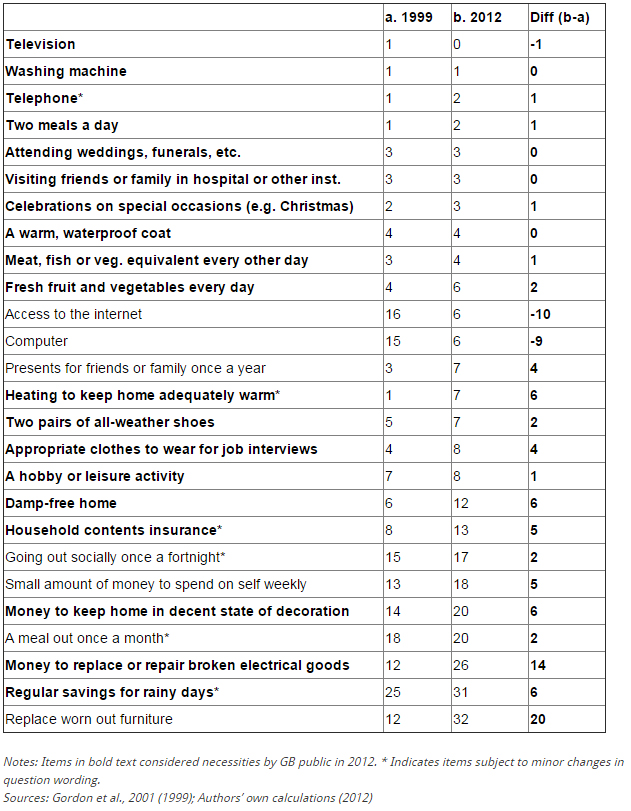 Deprivation of necessities has become more widespread in Britain since 1999
Deprivation of necessities has become more widespread in Britain since 1999
The 2008 financial crisis and subsequent austerity measures have seen the most sustained decline in household incomes since the 1930s. In this post, Eldin Fahmy examines their impacts on public perceptions of minimally adequate living standards, and on the extent of deprivation. Based upon analysis of survey data for 1999 and 2012, it seems that as households have been forced to ‘tighten their belts’, perceptions of minimum living standards have become less generous. At the same time the extent of deprivation has increased dramatically.
The 2012 UK Poverty and Social Exclusion survey (2012-PSE) is the latest and most comprehensive in a series of household surveys conducted since the early 1980s adopting a ‘consensual’ approach to poverty which reflect public views on minimally adequate living standards. Since our last survey in Britain in 1999, public perceptions of what constitute the ‘necessities of life’ have become less generous. Nevertheless, the proportion of adults in Britain deprived of these necessities has increased substantially since 1999.
Poverty in Britain today is widely understood in relative terms as an inability to take part in lifestyles and activities which are customary or widely approved in contemporary society due to insufficient resources. This requires direct observation of living standards and cannot be established simply be using arbitrary income thresholds. Since Mack and Lansley’s ground-breaking 1983 survey, surveys on poverty in 1990, 1999 and 2012 have therefore examined public views on minimally acceptable living standards and have incorporated these views within the definition and measurement of poverty itself.
One consistent finding emerging from these surveys has been the striking degree of public consensus across social groups (e.g. by gender, age, social class, income level, etc.) concerning the relative importance of different items and activities. Nevertheless, as deprivation is here understood to be relative to prevailing societal standards we should expect that perceptions of necessities will vary across time to reflect changing living standards, tastes and customs. What, then, do the British public view as necessities of life today and in what ways has this changed since our last survey in 1999?
Table 1 (below) shows the percentage of adults in 2012 and 1999 describing a comparable set of items and activities as ‘necessities’. In both 1999 and 2012 there is widespread agreement on many items, and perceptions of necessities extend far beyond what might be described as ‘basic’ needs to encompass a range of ‘social’ necessities. As predicted by relative deprivation theory, perceptions of necessities also reflect changes in prevailing living standards and consumption norms, for example, in relation to technological items which have become more widely available (and widely encouraged) over the 1999-2012 period.
Table 1: Percentage of people viewing items as necessities for adults in 1999 and 2012 in Britain

However, one implication of a relative approach is that during periods of declining living standards public perceptions of necessities may also become less generous. Given the sustained decline in household incomes and living standards arising from the 2008 financial crisis, it would be astonishing if this was not also reflected in public attitudes to the necessities of life. Table 1 suggests that this is indeed the case.
Many items record a substantial fall in the proportion of respondents who view them as necessities in 2012 compared with 1999, with those items where public support was more equivocal in 1999 witnessing an especially dramatic decline in approval. As household incomes have become more constrained, more basic necessities (towards the top of Table 1) are increasingly prioritised over more discretionary items. As we argue in our preliminary report, it seems that the public have scaled back their expectations regarding minimum living standards in ways which reflect the prevailing climate of austerity and pessimism. One consequence of recession and austerity program may be that the British public have ‘tightened their belts’ and now consider many things which in the past were viewed as essential to no longer be necessities.
However, even though public perceptions of minimum living standards became less generous, the extent of deprivation of necessities has nevertheless increased for adults in Britain over this period. Table 2 (below) shows the percentage of adults in Britain who lack different necessities in 1999 and 2012 because they cannot afford them. The proportion of adults unable to afford items and activities considered by the British public to be ‘necessities of life’ in 2012 has increased dramatically compared with 1999. For example, the percentage of adults unable to adequately heat their home has increased seven-fold, and the percentage unable to afford a damp-free home, or to replace broken electrical goods, or to afford appropriate clothes for job interviews has at least doubled over this period.
Table 2: Percentage of adults lacking items because they cannot afford them in 1999 and 2012 in Britain

There is now widespread agreement on what constitutes a minimally acceptable diet for adults, including two meals a day, fresh fruit and vegetables daily, and meat and fish every other day. However, an increasing number of adults are unable to afford to eat properly, with the percentage of British adults who are unable to afford at least one of these dietary essentials increasing from 5% in 1999 to 8% in 2012. Since Table 2 focuses on the same items measured in comparable ways in 1999 and 2012, there has been an absolute increase in social and material deprivation over this period amongst the British adult population.
Underpinning the growth in deprivation over this period has been a rising tide of income inequality over the 1999-2008 period which ensured that despite a period of sustained economic growth until 2008, the benefits of growth were for the most part not enjoyed by poorer households whose incomes and wages fell further and further behind those of the better-off in relative terms.
Following the 2008 recession there has been a modest decline in income inequality and relative income poverty, but this reflects an overall decline in societal standards rather than any absolute improvement in the circumstances of poorer households. Although this decline in living standards is also reflected in more restrictive public perceptions of necessities, the extent of social and material deprivation amongst adults in Britain has clearly increased substantially since 1999. Indeed, these findings reflect the situation in 2012 before the majority of proposed changes to welfare benefits came into effect. Since these measures are set to hit the poor hard, our findings almost certainly underestimate the true extent of social and material deprivation in Britain today.
Note: A longer version of this article was published in the Journal of Poverty and Social Justice (Vol 22, Issue 2) in October 2014.
This post was first published on the British Politics and Policy blog
About the Author
Dr Eldin Fahmyis Senior Lecturer in the School for Policy Studies at the University of Bristol. He is a member of the ESRC-funded 2012 UK Poverty and Social Exclusion Survey research team (Ref: RES-060–25–688 0052).

